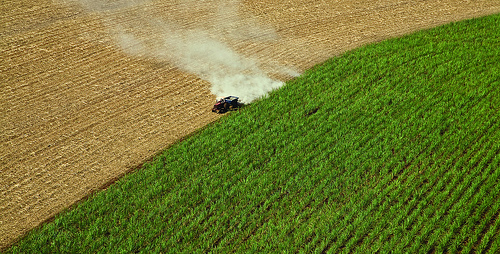Hydrogen --- Tomorrow's Biofuel?
Questions swirl around the idea of bioethanol as an alternative to gasoline for powering transport, but researchers from the University of Birmingham have started creating clean hydrogen from food waste, an idea that could revolutionise the bioenergy industry.
A look at Brazil — the world’s most intensive user of bioethanol — finds that mass-producing bioethanol from sugarcane is not as sustainable in the long-term as would be hoped. Bioethanol generates carbon dioxide as well as agricultural waste.
However, creating clean hydrogen from food waste not only uses up that waste, but provides a fuel that is emissions free and can be generated sustainably.

“Fuel cells need clean energy to run them. If you provide bacteria with a supply of sugary waste from, for example, chocolate production, the bacteria can produce hydrogen,” said Professor Lynne Macaskie, Professor of Applied Microbiology at the University of Birmingham, who presented the research at a collaborative bioenergy workshop in São Paulo on Monday. “At the moment manufacturers pay to dispose of waste but with our technique they could convert it to clean electricity instead.”
“Bioethanol is the current biofuel of choice in Brazil but our research shows the huge potential for biohydrogen to be the fuel for the future. Biohydrogen could even be made from the wastes from bioethanol production — two biofuels for the price of one. More work from focused teams, however, is needed, as agricultural wastes are tougher for bacteria to digest.”
A look at Brazil — the world’s most intensive user of bioethanol — finds that mass-producing bioethanol from sugarcane is not as sustainable in the long-term as would be hoped. Bioethanol generates carbon dioxide as well as agricultural waste.
However, creating clean hydrogen from food waste not only uses up that waste, but provides a fuel that is emissions free and can be generated sustainably.

“Fuel cells need clean energy to run them. If you provide bacteria with a supply of sugary waste from, for example, chocolate production, the bacteria can produce hydrogen,” said Professor Lynne Macaskie, Professor of Applied Microbiology at the University of Birmingham, who presented the research at a collaborative bioenergy workshop in São Paulo on Monday. “At the moment manufacturers pay to dispose of waste but with our technique they could convert it to clean electricity instead.”
“Bioethanol is the current biofuel of choice in Brazil but our research shows the huge potential for biohydrogen to be the fuel for the future. Biohydrogen could even be made from the wastes from bioethanol production — two biofuels for the price of one. More work from focused teams, however, is needed, as agricultural wastes are tougher for bacteria to digest.”
You can return to the main Market News page, or press the Back button on your browser.

